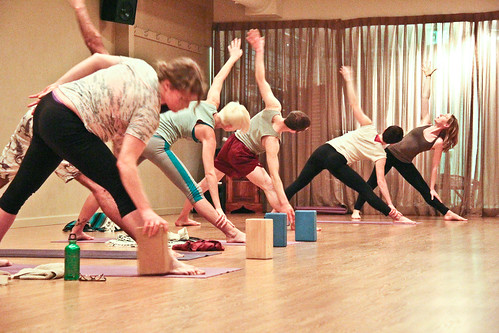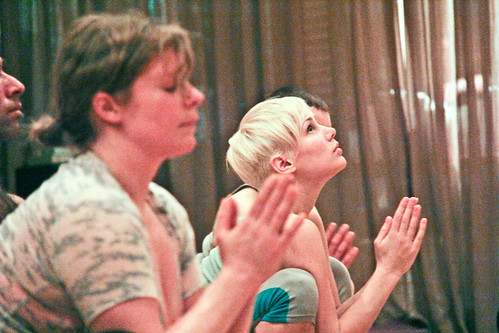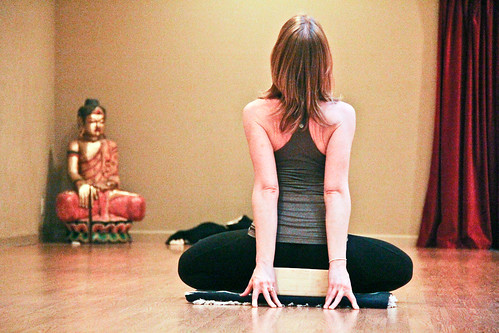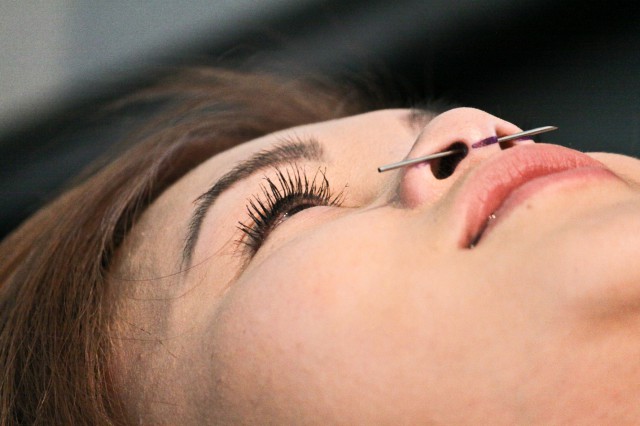
Written by Sage Kemmerley
Life can be overwhelmingly stressful. Especially in a busy city, things can happen. Traffic, spaced-out people, sometimes everything is in the way and there’s nothing to do about it. Or is there?
Ever wonder how monks really are so calm, no matter what? That calmness is attainable too, and it’s easier than one would think. Meditation and yoga focus on breathing as a way of staying in the moment. Concentrating on breathing, allows the mind to be present and not distracted by the past or the future. Acupuncture can help relieve physical and emotional symptoms and balance the body to further encourage positive health choices.
Eastern holistic practices like yoga, meditation, and acupuncture have been used as effective therapies for centuries – for everything from joint pain to depression. Holistic practices focus on how the many components of a hectic lifestyle can add up and result in stress – holistic practitioners address these issues as a whole.
Adam Burke, director of the Institute for Holistic Health Studies at San Francisco State University, says that through student surveys, he has found the majority of SFSU pupils find themselves suffering from anxiety and depression at some point during his or her time here.
“That’s often how people cope, by using drugs and alcohol, and there are clearly consequences to that in academia and life in general,” says Burke, “So finding alternatives to that is important.”
As an acupuncturist, meditation practitioner and yogi, Burke says he is intrigued by how all three practices play a role in alleviating depression and anxiety.
“The first time I got acupuncture I was in graduate school and working twenty hours a day on my thesis,” says Burke. “Afterwards I felt normal again. It was pretty amazing actually, how much it affected my emotional well-being. So that impressed me enough to become an acupuncturist.”
Burke explains how acupuncture resets the body like resetting a computer. It doesn’t give the body a “high” or a “low,” but rather balances between the two to bring the body back into harmony. Liz Borman, a yoga instructor and columnist in Berkeley, has a lot of faith in acupuncture as well. Borman developed an interest in alternative healing while studying the effects of Chinese herbs on breast cancer treatment at UCSF.
“My friend who’s an acupuncturist was practicing on me,” says Borman. “I was feeling upset and really confused and just had a lack of clarity, and she used some needles on me and I felt so much clearer.”
Acupuncture, like breathing, yoga, and meditation, is able to center the body by using small, painless needles to access certain meridians, or energy channels, to release blocked energy that can stagnate in the body due to emotional distress. According to acupuncturist Dr. Kristen Sparrow in San Francisco, it releases endorphins, serotonin and noradrenaline,into the body, all of which improve mood and energy levels.
Acupuncture treatments can even help patients quit smoking. According to Dr. Sparrow, her patients have typically been able to get off painkiller and antidepressant medications due to acupuncture treatment. Acupuncture has been shown to stimulate the brain to release pain-killing chemicals.

In contrast to Eastern medicine, Western medical practices isolate each condition as separate from another, and treat each independently. Many people suffering from depression and/or anxiety don’t find enough relief in prescribed medications and need something more wholesome to give their lives balance.
When it comes to the benefits of physical activity, Borman recommends morning yoga, and points out how it paves the way for a positive day. She notes the breathing aspect of yoga oxygenates the brain and the bloodstream, relaxing the body.
“This helps me ground myself into my body and just feel very grateful, very positive,” says Borman, “So that way I wake up feeling gratitude, and very excited and optimistic. It also balances the autonomic nervous system, calming and soothing the nerves.”
Borman also believes it’s important to recognize of the lifestyle aspect of yoga practice that celebrates how we are all empowered to make positive changes in our lives.
Both Borman and Burke recommend the more vigorous kinds of yoga in combating depression. And all types of yoga are beneficial since they bring our awareness back into the body, and prevent us from being distracted by other thoughts. Restorative yoga, for example, involves very little movement and can be good for people with chronic pain. Body-awareness yoga helps in focusing awareness on the body, which can help in identifying an on-coming cold or overlooked injuries.
According to yoga instructor Dr. Sharon Rafferty, yoga has also been shown to improve immune system response, release toxins, improve strength and balance, and overall well-being. Borman mentions how, even when a yoga position is uncomfortable, that discomfort is part of the awareness practice because the body can’t ignore what it’s feeling.
“For a lot of people who study, you’re so in your head that yoga literally puts you back in your body because you’re having to focus on your body,” says Borman.” It’s actually grounding your awareness into your physical self.”
She says it is also about allowing oneself to feel whatever it is the body is feeling that day, and doing so without judgment and criticism.
Yoga can become like meditation in the sense that both practices focus on only the movements of the body in that moment, according to Amy Weintraub, founder of LifeForce Yoga in Tucson, Arizona. Weintraub points out that yoga allows people to recognize their emotions and sensations without having to react to them, since in the present moment there is no shame, grief, or depression.
Both Weintraub and Borman say they were able to discontinue antidepressant and antianxiety medications after taking up yoga. Borman claims the medications were doing her more harm than good.
“For preventative and long term treatment, definitely yoga and diet are my saving grace,” says Borman, “So I definitely pay attention to them on a daily basis for my health.”
Listening to that inner voice, to the heart, or gut, or whatever you want to call it, can help when it comes to giving the body what it needs to thrive. Borman says she felt the need for a change in her life, and when her inner voice told her yoga was the right path, she listened to the message and fell in love with it right away. She also understands that some people may need assistance from antidepressants just to be able to get out the door to go to a yoga class, and she supports that decision.
“Everything has its benefits,” she says. “I believe that there’s a marriage between allopathic and alternative medicine, so it is a balance of both.”
In many cases, practicing meditation on a daily basis can do what medication can’t, that is, returning the brain to its most natural state. In trying to reach a “normal” level, people consume medication, alcohol, caffeine, and a whole list of substances. Burke says meditating transformed his experience as a student once he began leading meditation and yoga classes on campus as an undergrad.
“Meditation really changed my academics because it increased my capacity to focus, to stay on task, and just be much calmer,” says Burke. “I didn’t have test anxiety anymore.”
Dr. Rafferty notes that meditation helps us practice visualization, or positive imagery, to manifest our goals and dreams in life. Borman says she is committed to doing a twenty minute visualization meditation every night for that purpose exactly, in order to allow herself to focus positively on her goals.
“A lot of people say they don’t have time, that they can’t afford twenty minutes of their day to meditate because they’re so busy,” says Borman. “But I realized I didn’t have a choice; it was either, I wouldn’t have time and be miserable, or I would make the time and be happy.”
Burke agrees that meditation, like yoga, is about approaching life in a new way, to be proactive instead of reactive. It’s about engaging in a relationship with everyday thought patterns he says, and to integrate the messages of the heart and mind.
“Mindfulness meditation is good for changing one’s relationship with one’s thought patterns,” says Burke. “The philosophy underlying it is that life isn’t permanent. We have a natural tendency to want to hold onto things, to make them permanent, which is the root of our distress or unhappiness, because everything is fundamentally changing.”
Practicing meditation, yoga, awareness, and breathing may not seem easy at first, and it isn’t, but the benefits can be clear and immediate.
“That consistent effort on your part to connect into your body is like a muscle,” says Borman. “The more you use the muscle the stronger it gets. So if you repeat yoga and meditation exercises you just become more aware.”

These choices can bring instant benefits with no side effects, unlike some medications. However, these practices are just that, practices, and therefore require a steady commitment. Meditation, yoga, and breathing get to the root of the problem, which are usually both physical and emotional because the body holds onto both types of stress, and starts the release process. Releasing stress naturally is part of the body’s instinct to heal itself, like healing a wound, according to Borman.
Yoga, meditation, and acupuncture help restore balance to the body in a natural way, without the side effects of drugs. Some people benefit largely from a combination of medication and holistic practices, but for a majority, Eastern practices replace the need for pharmaceuticals. The holistic approach in addressing ailments as combined, rather than separate, can lead to more permanent effects on well- being than Western practices.
To get started on you own holistic path to better living, try these free and/or student-budget priced classes in SF:
-Urban Flow Yoga; donation-based yoga; 1543 Mission St. (@ S. Van Ness)
-The Sun Room; donation-based yoga; 2390 Mission St. (@ 20th)
-Laughing Lotus Yoga; donation-based yoga; 3271 16th St. (@ Dolores)
-Shambhala Meditation Center of SF; free meditation; 1231 Stevenson St. (@ Gough)
-San Francisco Zen Center; free meditation; 300 Page St. (@ Page)
-American College of Traditional Chinese Medicine; sliding scale prices w/ stu.ID; 450 Connecticut Street (@ 19th)
-San Francisco Community Acupuncture; sliding scale prices; 220 Valencia Street (@ Duboce)





seo company • Jun 26, 2013 at 11:19 pm
Hey!
I just found your web page: Golden Gate XPress Magazine when I was searching digg.
com. It looks as though someone liked your website so much they
decided to bookmark it – good job!
Visit my weblog: seo company